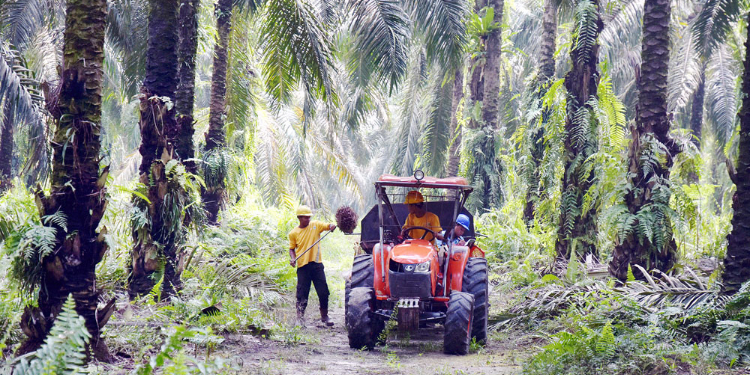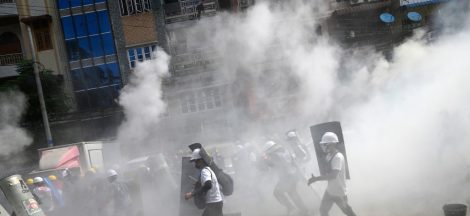Producers anticipate lower CPO exports due to price volatility, barriers. The crude palm oil (CPO) industry is anticipating weaker export figures this year as commodity prices remain highly volatile and barriers from major destination markets are increasing.

The Indonesian Palm Oil Producers Association (Gapki) has said that CPO exports fell significantly in April because of restrictive policies.
Gapki’s data shows that CPO exports in April fell 18 percent month-to-month from 2.96 million tons in March. Meanwhile, in May 2.79 million tons of CPO were exported, a 14 percent increase from April.
Gapki executive director Mukti Sardjono mentioned several import restrictions, such as high import duties in India, the implementation of a biofuel directive by the European Union and a United States-China trade war.
“We expect to see a slight increase in CPO exports over last year [in terms of volume], but the value is likely to decrease because of its low price,” Mukti told The Jakarta Post via text message on Tuesday.
India is the largest market for Indonesia’s palm oil and its derivatives with an export share of about 20 percent, Mukti said. In 2018, Indonesia exported 6.71 million tons of CPO to India. Out of Indonesia’s total CPO exports of 32 million tons, 4.78 million tons went to the EU, 4.41 million tons to China and 2.48 million tons to Pakistan.
Malaysia, the world’s second largest palm oil producer after Indonesia, was able to better penetrate the Indian market because of its 2011 Comprehensive Economic Cooperation Agreement (CECA) with that country, which offered reduced tariffs of 45 percent instead of the 54 percent imposed on the CPO of Indonesia and other producers.
Indonesia’s monthly exports to India was down by 4.5 percent to 185,550 tons in April, just as Malaysia’s exports jumped by 50 percent to 532,480 tons.
On the other hand, the EU’s European Commission adopted on March 13 the Delegated Regulation Supplementing Directive 2018/2001, or the Delegated Act, on sustainability criteria for biofuel, a derivative of the EU’s Renewable Energy Directive II (RED II).
The directive has stipulated a complete phase-out of palm oil by 2030 as the product has been declared a high-risk vegetable oil. The regulation singled out palm oil for having a high risk of causing deforestation based on the EU’s indirect land use change (ILUC) calculation, despite a study showing that other types of vegetable oil pose a similar, if not higher, deforestation risk.
Exports to the region immediately dropped by 37 percent to 315,240 tons in April following the adoption of the directive, Gapki data shows.
With such challenges, the association has decided not to set any export growth forecast for 2019, said Mukti. In 2018, exports of palm oil products grew by 8 percent.
“In order to improve the absorption of palm oil products, we support the government’s effort [to negotiate] with India to lower CPO import duties, as well as to push more exports toward the Middle East and African countries,” he said. “We also support the efforts to increase domestic CPO consumption through the adoption of a B20 fuel mix and [its upgrade] to B30.”
However, domestic consumption might not have been as reliable as Gapki had expected, as 516,000 tons of biodiesel were purchased in April, down by 2 percent from March.
From the policymaker side, Malaysia has expressed readiness to join forces with Indonesia in responding to the EU’s Delegated Act.
Malaysia’s Primary Industries Minister Teresa Kok said on Monday that the country would file a complaint with the World Trade Organization to challenge the directive, following in Indonesia’s footsteps.
After a ministerial meeting on Tuesday, the Council of Palm Oil Producing Countries (CPOPC), of which Indonesia and Malaysia are members, announced that it would establish a CPOPC-EU Joint Working Group on Palm Oil as a platform to conduct regular discussions with the European Commission.
“The ministers expressed regret that the Delegated [Act] has come into force on June 10, 2019. This is despite the various efforts undertaken by producing countries to provide information on their sustainability initiatives,” the council wrote in a statement following the meeting, where Indonesia was represented by Coordinating Economic Minister Darmin Nasution.
“The joint working group shall engage CPOPC member countries and other palm oil producing countries, such as African palm oil producers, and will raise the issue of the smallholders and poverty alleviation to counter the Delegated Act,” it added. Producers anticipate lower CPO exports due to price volatility, barriers (Rachmadea Aisyah, The Jakarta Post)





 Astra Faced with new Normal as New Brands Eat up Share
Astra Faced with new Normal as New Brands Eat up Share 